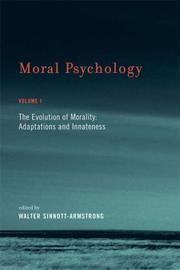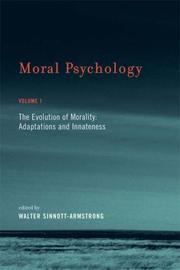| Listing 1 - 10 of 29 | << page >> |
Sort by
|
Book
ISBN: 0631157085 Year: 1988 Publisher: Oxford
Abstract | Keywords | Export | Availability | Bookmark
 Loading...
Loading...Choose an application
- Reference Manager
- EndNote
- RefWorks (Direct export to RefWorks)
General ethics --- Dilemma --- Ethics --- Deontology --- Ethics, Primitive --- Ethology --- Moral philosophy --- Morality --- Morals --- Philosophy, Moral --- Science, Moral --- Philosophy --- Values --- Decision making --- Logic --- Syllogism --- Dilemma. --- Ethics. --- Algemene ethiek

ISBN: 0195169727 0199786348 9786610559091 1280559098 0198037953 1423761766 Year: 2004 Publisher: Oxford Oxford University Press
Abstract | Keywords | Export | Availability | Bookmark
 Loading...
Loading...Choose an application
- Reference Manager
- EndNote
- RefWorks (Direct export to RefWorks)
Ongeloof --- Sceptici (Griekse filosofie) --- Scepticism --- Scepticisme --- Scepticisme (Griekse filosofie) --- Scepticisme (Philosophie grecque) --- Sceptiques (Philosophie grecque) --- Skepticism --- Skeptics (Greek philosophy) --- Unbelief --- Philosophy, Ancient --- Agnosticism --- Belief and doubt --- Free thought

ISBN: 0195187725 9780195187724 9780195342062 1435618475 9786611162641 1281162647 019804061X 0199884889 0195342062 0199786127 9780198040613 9781435618473 Year: 2006 Publisher: New York: Oxford university press,
Abstract | Keywords | Export | Availability | Bookmark
 Loading...
Loading...Choose an application
- Reference Manager
- EndNote
- RefWorks (Direct export to RefWorks)
Sinnott-Armstrong here provides an extensive survey of the difficult subject of moral beliefs. He covers theories that grapple with questions of morality such as naturalism, normativism, intuitionism, and coherentism. He then defends his own theory that he calls ""moderate moral skepticism,"" which is that moral beliefs can be justified, but not extremely justified.
Ethics --- Skepticism --- Ethics. --- Skepticism. --- Scepticism --- Unbelief --- Deontology --- Ethics, Primitive --- Ethology --- Moral philosophy --- Morality --- Morals --- Philosophy, Moral --- Science, Moral --- Agnosticism --- Belief and doubt --- Free thought --- Philosophy --- Values --- Acqui 2006
Book
ISBN: 9780262026680 9780262525473 0262026686 026252547X 0262321483 0262321491 Year: 2014 Publisher: Cambridge, Mass.: MIT Press,
Abstract | Keywords | Export | Availability | Bookmark
 Loading...
Loading...Choose an application
- Reference Manager
- EndNote
- RefWorks (Direct export to RefWorks)
Traditional philosophers approached the issues of free will and moral responsibility through conceptual analysis that seldom incorporated findings from empirical science. In recent decades, however, striking developments in psychology and neuroscience have captured the attention of many moral philosophers. This volume of Moral Psychology offers essays, commentaries, and replies by leading philosophers and scientists who explain and use empirical findings from psychology and neuroscience to illuminate old and new problems regarding free will and moral responsibility. The contributors—who include such prominent scholars as Patricia Churchland, Daniel Dennett, and Michael Gazzaniga—consider issues raised by determinism, compatibilism, and libertarianism; epiphenomenalism, bypassing, and naturalism; naturalism; and rationality and situationism. These writings show that although science does not settle the issues of free will and moral responsibility, it has enlivened the field by asking novel, profound, and important questions.
Ethics --- Psychology and philosophy --- Neurosciences --- Philosophical anthropology --- General ethics --- Filosofische antropologie --- Algemene ethiek --- Ethics. --- Free will and determinism. --- Responsibility. --- PHILOSOPHY/General --- COGNITIVE SCIENCES/General
Book
ISBN: 0190280336 019028031X 0190280328 0190280301 9780190280307 Year: 2016 Publisher: Oxford: Oxford university press,
Abstract | Keywords | Export | Availability | Bookmark
 Loading...
Loading...Choose an application
- Reference Manager
- EndNote
- RefWorks (Direct export to RefWorks)
Modern medicine enables us to keep many people alive after they have suffered severe brain damage and show no reliable outward signs of consciousness. Many such patients are misdiagnosed as being in a permanent vegetative state when they are actually in a minimally conscious state. This mistake has far-reaching implications for treatment and prognosis. To alleviate this problem, neuroscientists have recently developed new brain-scanning methods for detecting consciousness in some of these patients and even for asking them questions, including "Do you want to stay alive?" These new technological abilities raise many questions about what exactly these methods reveal (Is it really consciousness?), how reliable they are (Do they fail to detect consciousness in some patients who are conscious?), what are these patients' lives like (Do they feel pain?), what we should do for and to these patients (Should we let them die?), who should decide (Are these patients competent to decide for themselves?), and which policies should governments and hospitals enact (Which kinds of treatment should be made available?). All of these questions and more are addressed in this collection of original papers. The prominent contributors provide background information, survey the issues and positions, and take controversial stands from a wide variety of perspectives, including neuroscience and neurology, law and policy, and philosophy and ethics. This collection should interest not only academics but anyone who might suffer brain damage, which includes us all.
Brain damage. --- Neurosciences. --- Ethics. --- Deontology --- Ethics, Primitive --- Ethology --- Moral philosophy --- Morality --- Morals --- Philosophy, Moral --- Science, Moral --- Philosophy --- Values --- Neural sciences --- Neurological sciences --- Neuroscience --- Medical sciences --- Nervous system --- Brain --- Psychology, Pathological --- Diseases --- Wounds and injuries --- Droit médical --- consciousness, vegetative state, minimally conscious state, death, disability, pain, brain damage, neuroscience, fMRI, ethics --- Professional ethics. Deontology --- Medical law --- Neuropathology

ISBN: 9780262693547 9780262195614 0262195615 0262693542 9780262195690 0262195690 9780262693578 0262693577 9780262195645 026219564X 9780262693554 0262693550 0262302985 0262303019 0262302950 0262302993 0262303027 0262302969 9780262302951 9780262302982 9780262303019 Year: 2008 Publisher: Cambridge, Mass. The MIT Press
Abstract | Keywords | Export | Availability | Bookmark
 Loading...
Loading...Choose an application
- Reference Manager
- EndNote
- RefWorks (Direct export to RefWorks)
"For much of the twentieth century, philosophy and science went their separate ways. In moral philosophy, fear of the so-called naturalistic fallacy kept moral philosophers from incorporating developments in biology and psychology. Since the 1990s, however, many philosophers have drawn on recent advances in cognitive psychology, brain science, and evolutionary psychology to inform their work. This collaborative trend is especially strong in moral philosophy, and these three volumes bring together some of the most innovative work by both philosophers and psychologists in this emerging interdisciplinary field. The neuroscience of morality is in its infancy, with the first brain imaging studies of moral development undertaken only in 2001. The contributors to volume 3 sample the best work in this very new field, discussing a variety of approaches, including functional imaging, lesion studies, abnormal psychology, and developmental neuroscience. Each chapter includes an essay, comments on the essay by other scholars, and a reply by the author(s) of the original essay. Topics include the neural basis of moral emotions and moral judgments as well as comparisons of normal adult moral judgments with those made by children, adolescents, and people with psychopathy, brain damage, and autism"--Publisher's website.
Cognitive psychology --- ethiek --- General ethics --- ethics [philosophy] --- cognitieve psychologie --- Ethics. --- Neurosciences. --- Psychology and philosophy. --- Affective and dynamic functions --- Cognitieve psychologie --- Algemene ethiek --- ethiek [filosofie] --- Psychische functies --- Deontology --- Ethics, Primitive --- Ethology --- Moral philosophy --- Morality --- Morals --- Philosophy, Moral --- Science, Moral --- Philosophy --- Values --- Neural sciences --- Neurological sciences --- Neuroscience --- Medical sciences --- Nervous system --- Philosophy and psychology --- COGNITIVE SCIENCES/General --- PHILOSOPHY/General

ISBN: 0262337282 0262337290 0262533189 026203557X 9780262337281 9780262195614 0262195615 9780262693547 0262693542 9780262195690 0262195690 9780262693578 0262693577 9780262195645 026219564X 9780262693554 0262693550 9780262026680 0262026686 9780262525473 026252547X 0262321483 9780262321488 9780262337298 0262321491 Year: 2008 Publisher: Cambridge, Mass. MIT Press
Abstract | Keywords | Export | Availability | Bookmark
 Loading...
Loading...Choose an application
- Reference Manager
- EndNote
- RefWorks (Direct export to RefWorks)
Groundbreaking essays and commentaries on the ways that recent findings in psychology and neuroscience illuminate virtue and character and related issues in philosophy.Philosophers have discussed virtue and character since Socrates, but many traditional views have been challenged by recent findings in psychology and neuroscience. This fifth volume of Moral Psychology grows out of this new wave of interdisciplinary work on virtue, vice, and character. It offers essays, commentaries, and replies by leading philosophers and scientists who explain and use empirical findings from psychology and neuroscience to illuminate virtue and character and related issues in moral philosophy. The contributors discuss such topics as eliminativist and situationist challenges to character; investigate the conceptual and empirical foundations of self-control, honesty, humility, and compassion; and consider whether the virtues contribute to well-being.ContributorsKarl Aquino, Jason Baehr, C. Daniel Batson, Lorraine L. Besser, C. Daryl Cameron, Tanya L. Chartrand, M. J. Crockett, Bella DePaulo, Korrina A. Duffy, William Fleeson, Andrea L. Glenn, Charles Goodman, Geoffrey P. Goodwin, George Graham, June Gruber, Thomas Hurka, Eranda Jayawickreme, Andreas Kappes, Kristjan Kristjansson, Daniel Lapsley, Neil Levy, E.J. Masicampo, Joshua May, Christian B. Miller, M. A. Montgomery, Thomas Nadelhoffer, Eddy Nahmias, Hanna Pickard, Katie Rapier, Raul Saucedo, Shannon W. Schrader, Walter Sinnott-Armstrong, Nancy E. Snow, Gopal Sreenivasan, Chandra Sripada, June P. Tangney, Valerie Tiberius, Simine Vazire, Jennifer Cole Wright
Ethics --- Psychological aspects. --- Deontology --- Ethics, Primitive --- Ethology --- Moral philosophy --- Morality --- Morals --- Philosophy, Moral --- Science, Moral --- Philosophy --- Values --- Ethics. --- Psychology and philosophy. --- Neurosciences. --- PHILOSOPHY/General --- COGNITIVE SCIENCES/General --- Neural sciences --- Neurological sciences --- Neuroscience --- Medical sciences --- Nervous system --- Philosophy and psychology --- Free will and determinism. --- Compatibilism --- Determinism and free will --- Determinism and indeterminism --- Free agency --- Freedom and determinism --- Freedom of the will --- Indeterminism --- Liberty of the will --- Determinism (Philosophy) --- Psychology and philosophy --- Neurosciences --- Responsibility. --- Accountability --- Moral responsibility --- Obligation --- Supererogation
Book
ISBN: 0199713944 0199910464 9780199713943 0195337638 9780195337631 9780199910465 0197731031 Year: 2009 Publisher: Oxford Oxford University Press, USA
Abstract | Keywords | Export | Availability | Bookmark
 Loading...
Loading...Choose an application
- Reference Manager
- EndNote
- RefWorks (Direct export to RefWorks)
Some argue that atheism must be false, since without God, no values are possible, and thus 'everything is permitted.' Walter Sinnott-Armstrong argues that God is not only not essential to morality, but that our moral behavior should be utterly independent of religion.
Religion and ethics. --- Atheism. --- Philosophy --- Agnosticism --- Free thought --- Irreligion --- Religion --- Secularism --- Theism --- Ethics and religion --- Ethics --- Ethics.
Book
ISBN: 9780195337631 9780199841356 Year: 2009 Publisher: Oxford Oxford University Press
Abstract | Keywords | Export | Availability | Bookmark
 Loading...
Loading...Choose an application
- Reference Manager
- EndNote
- RefWorks (Direct export to RefWorks)
General ethics --- Atheism --- Religion and ethics --- 211 --- 241 --- Philosophy --- Agnosticism --- Free thought --- Irreligion --- Religion --- Secularism --- Theism --- Ethics and religion --- Ethics --- God. Opperwezen. Oneindige: deïsme; theïsme; atheïsme --- Moraaltheologie. Theologische ethiek
Book
ISBN: 9780262035576 9780262533188 Year: 2017 Publisher: Cambridge, Mass. The Mit Press
Abstract | Keywords | Export | Availability | Bookmark
 Loading...
Loading...Choose an application
- Reference Manager
- EndNote
- RefWorks (Direct export to RefWorks)
Affective and dynamic functions --- Cognitive psychology --- General ethics
| Listing 1 - 10 of 29 | << page >> |
Sort by
|

 Search
Search Feedback
Feedback About UniCat
About UniCat  Help
Help News
News